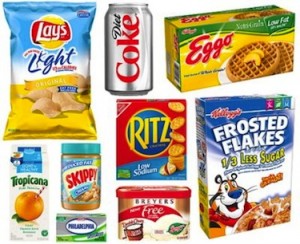Fat/Carb Free foods actually worse for you?
When I walk through the grocery store, I am amazed at how many choices are available that did not exist 10 years ago. Between low fat, fat free, carb free and a plethora of other varieties of modifications, one would think it would be simple to choose the right foods to meet health and weight loss goals. This is true, IF you have a good understanding of the difference in these food items.
First let’s start with fat-free, low-fat, and reduced-fat foods. I remember a time when people were avoiding fat altogether, thinking that if the person does not want to get fat, than the person should not eat fat! It is now well known that we need some fat in our diets to stay healthy, and eating too much fat may lead to weight gain. However, choosing foods that are fat-free may not be any lower in calories than the full-fat version. How can that be, you ask??? The food manufacturers need to replace the satisfying taste of fat with SOMETHING, so often they replace it with sugar or another form of carbohydrate.
Here is what I mean. Take peanut butter for example (I am comparing JIF-per 2 Tbsp servings).
Reduced Fat Peanut Butter vs. Classic Peanut Butter
| Total Fat | 12g | 16g |
| Saturated Fat | 2g | 3g |
| Total Carbohydrates | 15g | 7g |
| Calories | 190 | 190 |
When you compare ingredients, the reduced-fat version’s second and third ingredients are corn syrup solids and sugar, respectively. As you can see by looking at the numbers, choosing the reduced-fat version doesn’t even save you any calories!
Another topic I see is clients going carb-free crazy! Any food that is labeled low carb or no carb is a good choice, right? Not necessarily! Check out the Klondike CarbSmart ice cream bars…granted one bar has fewer carbohydrates than most other brands, however it also has FIFTEEN grams of fat, with ELEVEN of them being saturated fat! Yikes!
The moral of the story is that only choosing “fat free” or “low carb” is not good enough. You must read the food labels and become familiar with what is really best for you and your goals.
Written By: Lauren Manaker has her masters degree in nutrition, is a registered dietitian and LD. She works at Roper Saint Francis as a clinical dietitian. Lauren is also a certified personal trainer. If you have any questions about healthy eating, please feel free to post comments or contact her under our “In Home Trainers and Dietitians” on the home page.

